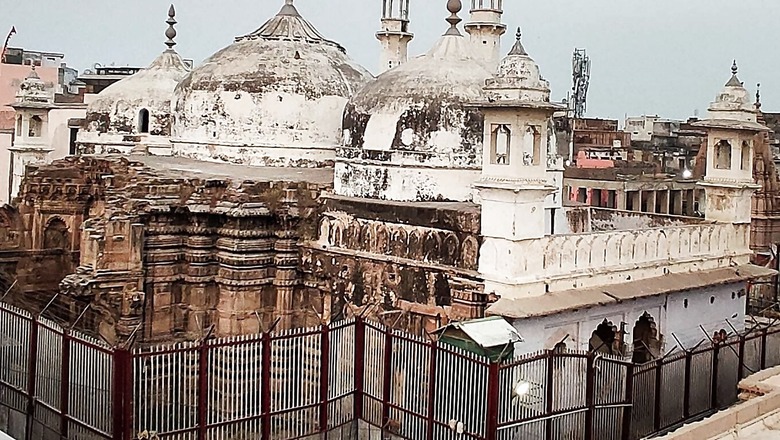
views
The Supreme Court on Friday transferred the civil suit filed with regard to worship inside the Gyanvapi mosque by Hindu devotees to the Varanasi district judge, saying it was keeping in mind complexities and sensitivity of the issue. The top court said the matter should be handled by a “senior and experienced” judicial officer.
The top court was hearing a plea by Anjuman Intezamia Masajid Committee, against an order by a Varanasi court for a videographic survey of the Gyanvapi Mosque complex adjacent to the famous Kashi Vishwanath Temple in Varanasi.
A bench of Justices DY Chandrachud, Surya Kant, and PS Narasimha said it is not casting any aspersion on the civil judge (senior division) who was earlier dealing with the suit. The SC directed the district judge to first decide the application under Order 7 Rule 11 of CPC (on maintainability) filed by the mosque committee.
The SC, however, said the interim order dated May 17 directing protection of the “shivling” area and allowing Muslims to offer namaz in the premises shall remain in operation till the maintainability of the suit is decided.
It also said, thereafter, the aggrieved parties will have eight weeks to approach a higher court. The bench also directed the district magistrate to make adequate arrangements for ‘wazu’ (ablutions) for Muslims coming to offer namaz inside the premises in consultation with those involved in the dispute.
The SC said, “District judge will decide mosque committee’s plea that suit by Hindu party isn’t maintainable and till then interim order-protection of Shivling area, free access to Muslims for namaz-will continue.”
It observed, “A slightly more seasoned and mature hand should hear this case. We’re not casting aspersions on the trial judge. But a more seasoned hand should deal with this case and it’ll benefit all parties.”
‘Complex social problem’
Hearing arguments from the Muslim side, the apex court said this was a “complex social problem” and a solution by a human cannot be perfect. “Our order is to maintain a certain degree of peace and calm, and our interim orders calm some frayed nerves with a healing touch. We’re on a joint mission for preserving a sense of unification in the country,” the SC said.
Senior advocate for the mosque committee, Huzefa Ahmadi, asked as to what will happen on the ground till the plea was decided. “You have to see how this case is being used for four or five mosques across the country. This will create public mischief, which the 1991 Worship Act wanted to avoid,” Ahmadi said.
Ahmadi further argued that the mosque committee’s challenge to the trial court’s order was the appointment of the commission itself, which was prohibited by the 1991 Worship Act and the Constitution. The Act stated that such controversies will create “great public mischief” and the report was also being selectively leaked, the advocate added.
To this, the SC said once the commission’s report was presented, there cannot be selective leaks. “Do not leak things to the press, only judge opens the report,” it added.
Ahmadi said the according to the mosque committee, what has been found inside the wazookhana is not a shivling but a fountain. But, the wazookhana has now been sealed and iron gates have been placed with heavy police deployment, the lawyer added.
To this, the SC said ascertainment of religious character is not barred under Section 3 of the 1991 Places of Worship Act. “Forget there is mosque on one side and temple on the other. Suppose there is a Parsi temple and there is a cross in the corner of the area. Does the presence of agyari make the cross agyari or agyari Christian? This hybrid character is not unknown. Here, a structure of Zoroastrian faith will not make the Christian structure Zoroastrian or vice versa, but the ascertainment of religious character of a place may not necessarily fall foul of Section 3 of the 1991 Act,” the top court observed.
The SC further posted hearing of the plea for the mosque committee to the second week of July. The lawyer for the Hindu side, Vishnu Jain, said the Muslim side had said the suit filed by us (Hindus) is not maintainable. “They submitted an application under Order 7, Rule 11 CPC to reject it. As per them, this suit is barred from Places of Worship Act. SLP will be listed on the second week of July,” he added.
Jain further said, “SC says the trial of the matter will be done by district judge Varanasi. SC says its interim order of May 17 for protection of Shivling area will continue. Arrangement of wazu will be done. We’re very happy with order.”
Read all the Latest India News here

















Comments
0 comment